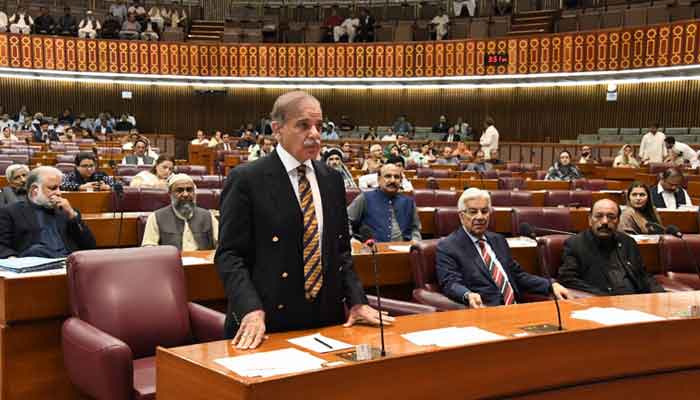ISLAMABAD: An in-camera session of the National Assembly’s National Security Committee (NSC) is underway at the lower house, in which the military leadership is expected to brief the lawmakers on the country’s prevailing national security situation.
The session is being chaired by NA Speaker Raja Pervez Ashraf.
According to sources, Chief of Army Staff (COAS) General Asim Munir and Inter-Services Intelligence (ISI) Chief Lt Gen Nadeem Ahmed Anjum will give a detailed overview of the current situation to the members.
The development comes after a national security huddle — headed by Prime Minister Shehbaz Sharif — decided last week to launch fresh military operation to flush out rising militancy in the country.
Notices have been issued by the National Assembly Secretariat and all federal ministers, advisers and MNAs have been invited to attend the meeting.
Secretaries of interior, foreign affairs, finance, defence and information and broadcasting have also been invited to attend the meeting while the four provincial chief ministers, chief secretaries and IGPs were issued special invitations by the NA Secretariat.
‘Healthy interaction’
On Thursday, Prime Minister Shehbaz announced that the National Assembly would be given an in-camera briefing on national security matters on Friday (today).
Responding to a point raised by MNA Ali Wazir from Waziristan, PM Shehbaz informed the house that during the in-camera briefing, parliamentarians would also be able to put their respective questions on the relevant subject.
He assured the MNA that all of his reservations would be listened to and responded positively to satisfy his concerns.
“This would be a healthy interaction. There would be no discussion to spoil the situation, rather it would be an attempt to rectify the matters,” the prime minister remarked.
Speaking on the occasion, Defence Minister Khawaja Asif had said the military leadership would attend the National Assembly session and respond to the queries of the members. He further added that the military leadership was cognisant of the challenge posed by terrorism.
He voiced serious concerns over the surge in terrorism and demanded that terrorists’ facilitators settled in the civilian areas must be held accountable.
Asif, who recently visited Kabul along with DG ISI to convey Pakistan’s concerns on the TTP activities, said terrorism increased after people from Afghanistan settled in Pakistan.
“Terrorists have settled in the residential areas. Action should be taken against the people who have helped them settle,” he said while referring to the previous Imran Khan-led government.
“These people have political support, as they are also present at Zaman Park. They have the support of Khan,” he said.
The defence minister added that the first Afghan war took place during the reign of General Zia, while the second war happened during the rule of General (retd) Musharraf after 9/11.
He seconded MNA Mohsin Dawar and Ali Wazir and said they were correctly saying that the people in those areas were suffering for the sins they did not commit.
Speaking on a point of order, Ali Wazir appealed to the government to stop the military operation in the tribal areas. He said another operation in the tribal areas had been discussed in the NSC huddle.
“We have come to know that even the GHQ has not been taken into confidence and the generals who had retired should be dealt with first,’” he said.
He said the people who spread mistrust had now come to the settled areas of the country.
“When the Taliban came to Afghanistan, sweets were distributed in the country, as Pakistan had problems and differences with the past Afghan rulers,” he recalled.


 Latest News3 days ago
Latest News3 days ago
 Latest News3 days ago
Latest News3 days ago
 Entertainment3 days ago
Entertainment3 days ago
 Latest News3 days ago
Latest News3 days ago
 Latest News3 days ago
Latest News3 days ago
 Latest News3 days ago
Latest News3 days ago
 Latest News3 days ago
Latest News3 days ago
 Latest News3 days ago
Latest News3 days ago























